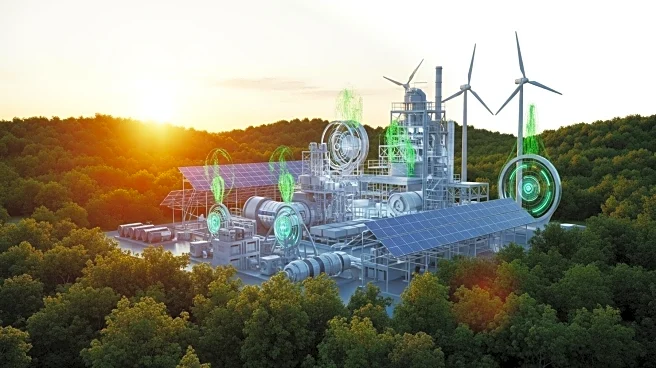What's Happening?
The Maharashtra government has signed nine Memorandums of Understanding (MoUs) with leading steel manufacturers during the AIIFA Steelex 2025 conference. These agreements represent a record investment commitment of ₹80,962 crore, aimed at transforming Maharashtra into India's top steel producer and a hub for green steel exports. The conference, themed 'Profitable Sustainability – Green Steel: A Future Ecosystem,' was attended by key figures including Maharashtra Chief Minister Devendra Fadnavis and Union Minister for New and Renewable Energy Pralhad Joshi. The investments are expected to generate over 90,300 jobs across the state, with significant projects planned in regions like Vidarbha, Marathwada, and Pune.
Why It's Important?
This development is crucial for Maharashtra's economic growth and its ambition to lead in sustainable steel production. The focus on green steel aligns with India's broader environmental goals, including the Net Zero 2070 target. The investment will not only boost local employment but also position Maharashtra as a strategic player in the global steel market. The transition to green steel is seen as a national growth opportunity, with potential benefits for India's export capabilities and industrial competitiveness. The initiative also supports the rehabilitation of former Naxalites through job creation in the steel industry.
What's Next?
The next steps involve the implementation of the signed MoUs, with projects expected to commence in various regions. The government will focus on creating infrastructure to support these investments and ensure the transition to green steel production. Stakeholders will likely monitor the progress of these projects and their impact on local communities and the environment. The AIIFA will continue to facilitate discussions on regulatory frameworks and policy measures to enhance competitiveness in the steel sector.
Beyond the Headlines
The emphasis on green steel production highlights the ethical and environmental dimensions of industrial growth. It reflects a shift towards sustainable practices in manufacturing, which could influence other sectors to adopt similar approaches. The initiative may also lead to long-term changes in workforce skills and industry standards, promoting innovation and resilience in the face of global environmental challenges.









